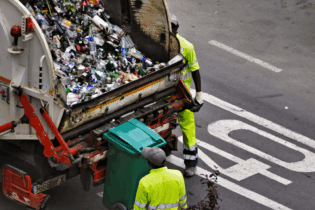Mpact Recycling reports that paper recycling has grown almost exponentially, with the volume of paper recovered for recycling in South Africa increasing by almost a third in the last ten years. At this rate, it can be around 63% by 2017.
This, Mpact says, according to the statistics from the Paper Recycling Association of South Africa. This means that South Africa is just ahead of the global recovery rate of 55.6%. Mpact recovers 45% of all waste paper per year, representing around 450 000 tonnes. Most comes from printers, box manufacturers, industries and malls. In 2000 recovery rates were around 38% and this grew slowly to 59% last year. “There is no doubt that we are beginning to see a culture of recycling in homes, schools and small businesses, as well as across many industries nationwide, which is reflected in the growth figures we’ve observed over the past decade,” according to John Hunt, managing director of Mpact Recycling. “However, there is still plenty of room for improvement, particularly in collections from households.” Hunt says that only 10% of waste paper is currently collected in offices, households and schools so there is much room for improvement.“We have put a variety of different mechanisms in place to recover paper from consumers and businesses, and are constantly looking for opportunities to improve the amount of paper recovered by educating the public on the benefits of recycling. “The growth in paper recovery rates is also a promising trend for the country because of the obvious environmental benefits to recycling. Not only are greenhouse gas emissions reduced, but recycling also lessens the impact on already pressured landfill sites since the need for landfilling is avoided. Related to that, of course, is the drop in waste disposal costs.”
But, and this is possibly the most important factor – the collection and processing of recovered paper is generating economic activity. The recycling industry creates opportunities for small, medium and micro enterprises through its recycle collection programmes and is a major contributor to job growth in this country. It is estimated that 100 000 people are employed in the recycling industry in South Africa, with around 30 000 of these involved in paper recycling alone.
Hunt says that Mpact most significant source of paper is the small and locally based business that collects and delivers to Mpact.
From informal collectors to small operators with one pick-up and even the large companies, the money filters through and creates jobs. It offers employment opportunities for entrepreneurs and for traders to deliver to buy-back centres. Mpact has helped establish 42 buy-back centres with equipment, financial help as well as fundamental business training as one of its enterprise initiatives. Linked to the economy is the fact that the recovered paper is beneficiated locally. The paper the company collects is used as a raw material by the company mills to make recycle-based paper which, in turn, is processed by the corrugated business into recycled-based container board and carton board. This creates significant downstream employment opportunities. Mpact Recycling’s largest processing plant is situated in Tulisa Park, Gauteng. Mpact also runs regional offices and processing plants around the country, including in Pretoria, Durban, Richards Bay, Springs in Midrand and Parow in the Western Cape. Source: thepaperstory.co.za





